Filter by
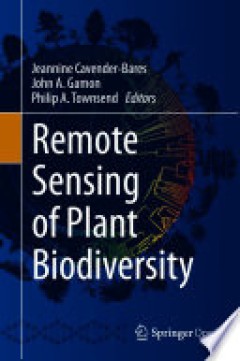
Remote sensing of plant biodiversity
This Open Access volume aims to methodologically improve our understanding of biodiversity by linking disciplines that incorporate remote sensing, and uniting data and perspectives in the fields of biology, landscape ecology, and geography. The book provides a framework for how biodiversity can be detected and evaluated—focusing particularly on plants—using proximal and remotely sensed hype…
- Edition
- -
- ISBN/ISSN
- 9783030331573
- Collation
- xxii + 581 p
- Series Title
- -
- Call Number
- 333.9530285 JEA r
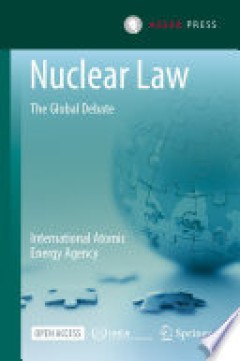
Nuclear law : the global debate
This open access book traces the journey of nuclear law: its origins, how it has developed, where it is now, and where it is headed. As a discipline, this highly specialized body of law makes it possible for us to benefit from the life-saving applications of nuclear science and technology, including diagnosing cancer as well as avoiding and mitigating the effects of climate change. This book se…
- Edition
- -
- ISBN/ISSN
- 9789462654952
- Collation
- viii + 333 p
- Series Title
- -
- Call Number
- 343.0925 NUC n
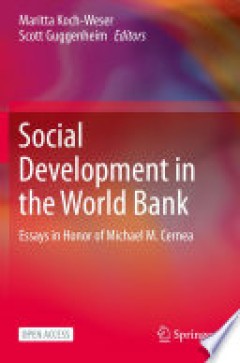
Social development in the world bank : essays in honor of michael m. cernea
This open access book honors the work of Michael Cernea, who was the World Bank’s first professional sociologist, by taking on and extending his arguments for "putting people first.” Cernea led a community of social scientists in formulating and promoting a comprehensive set of innovative and original social policies on development issues, which the World Bank adopted and implemented. This …
- Edition
- -
- ISBN/ISSN
- 9783030574260
- Collation
- XXI, 368 p
- Series Title
- -
- Call Number
- 361.6 MAR s
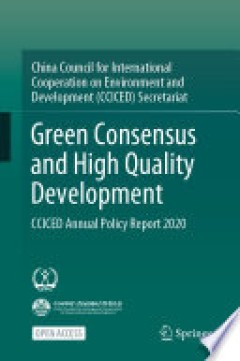
Green consensus and high quality development : cciced annual policy report 2020
This open access book is based on the research outputs of China Council for International Cooperation on Environment and Development (CCICED) in 2020. It covers major topics of Chinese and international attention regarding green development, such as climate, biodiversity, ocean, BRI, urbanization, sustainable production and consumption, technology, finance, value chain, and so on. It also looks…
- Edition
- -
- ISBN/ISSN
- 9789811647994
- Collation
- XXX, 587 p
- Series Title
- -
- Call Number
- 338.951 ZHA g
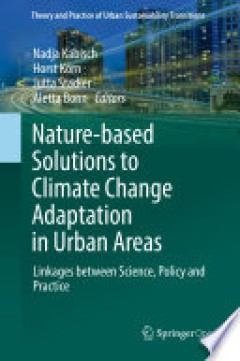
Nature-Based Solutions to Climate Change Adaptation in Urban Areas: Linkages …
This open access book brings together research findings and experiences from science, policy and practice to highlight and debate the importance of nature-based solutions to climate change adaptation in urban areas. Emphasis is given to the potential of nature-based approaches to create multiple-benefits for society. The expert contributions present recommendations for creating synergies bet…
- Edition
- 1
- ISBN/ISSN
- 9783319560915
- Collation
- -
- Series Title
- -
- Call Number
- 307.1216 KAB n
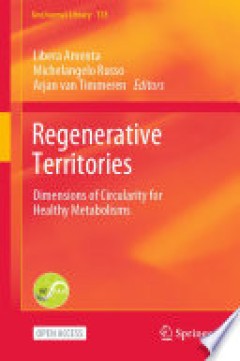
Regenerative territories : dimensions of circularity for healthy metabolisms
This open access book provides new perspectives on circular economy and space, explored towards the definition of regenerative territories characterised by healthy metabolisms. Going beyond the mere reuse/recycle of material waste as resources, this work aims to understand how to apply circularity principles to, among others, the regeneration of wastescapes. The main focus is the development ov…
- Edition
- -
- ISBN/ISSN
- 9783030785369
- Collation
- XXX, 318 p
- Series Title
- -
- Call Number
- 338.927 LIB r
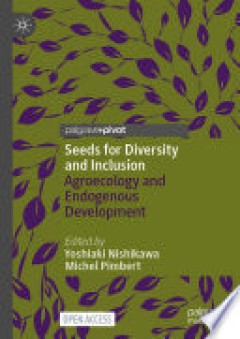
Seeds for diversity and inclusion : agroecology and endogenous development
This open access book will contribute to a more nuanced debate around seed system resilience that goes beyond the dominant dichotomous conceptualization of seed governance often characterized as traditional vs modern, subsistence vs commercial, or local vs global. While reflecting on the expanding oligopoly in the current seed system, the authors argue that such classifications limit our abilit…
- Edition
- -
- ISBN/ISSN
- 9783030894054
- Collation
- XIX, 199 p
- Series Title
- -
- Call Number
- 631.521 YOS s
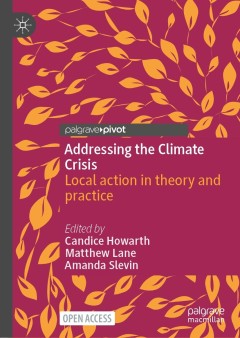
Addressing the Climate Crisis: Local Action in Theory and Practice
This open access book brings together a collection of cutting-edge insights into how action can and is already being taken against climate change at multiple levels of our societies, amidst growing calls for transformative and inclusive climate action. In an era of increasing recognition regarding climate and ecological breakdown, this book offers hope, inspiration and analyses for multi-level …
- Edition
- -
- ISBN/ISSN
- 9783030797393
- Collation
- xxv, 143p : ill.
- Series Title
- -
- Call Number
- 363.705 ADD a
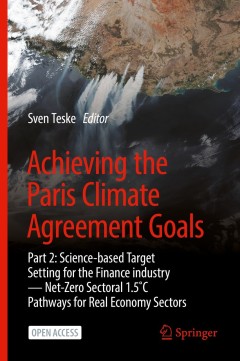
Achieving the Paris climate agreement goals : Part 2: science-based target se…
This open access book is designed as a continuation of the editor’s 2019 book Achieving the Paris Climate Agreement Goals. This volume provides an in-depth analysis of industry sectors globally, and its purpose is to present emission reduction targets in 5-year steps (2025 to 2050) for the main twelve finance sectors per the Global Industry Classification System. This scientific analysis aims…
- Edition
- 1
- ISBN/ISSN
- 9783030991777
- Collation
- lxxviii: 384 PG; ill.
- Series Title
- -
- Call Number
- 621.042 ACH a
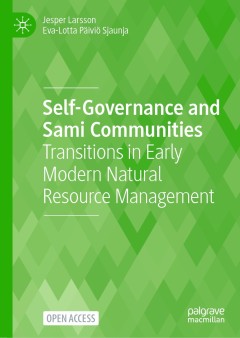
Self-governance and sami communities : Transitions in Early Modern Natural Re…
This open access book uses an interdisciplinary approach that not only focuses on social organization but also analyzes how societies and ecological settings were interwoven. How did early modern indigenous Sami inhabitants in interior northwest Fennoscandia build institutions for governance of natural resources? The book answers this question by exploring how they made decisions regarding natu…
- Edition
- -
- ISBN/ISSN
- 9783030874988
- Collation
- xvi; 247 PG; ill.
- Series Title
- -
- Call Number
- 333.70899457 SEL s
 Computer Science, Information & General Works
Computer Science, Information & General Works  Philosophy & Psychology
Philosophy & Psychology  Religion
Religion  Social Sciences
Social Sciences  Language
Language  Pure Science
Pure Science  Applied Sciences
Applied Sciences  Art & Recreation
Art & Recreation  Literature
Literature  History & Geography
History & Geography